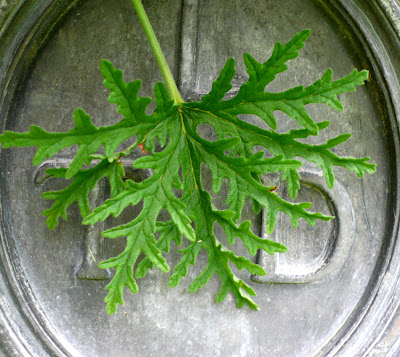I can see that Peter is trying his best. We are still working in the potato corner of the walled garden. 'Plants produce scent for attraction as well as defence. The lemon-smelling plants all share the essential oil limonene.'
But they're not lemons, I say.
'Why do you find that surprising?' he asks, incredulously. 'Why is it surprising to call something with lemon in it, lemon? If you use the word red for describing the property of a plant, that's not surprising. We are simply describing the red property that disparate plants share from a human point of view. The colour red,' he says, very slowly and emphatically, 'Is... just... a... gene. As is a particular scent.'
I don't think that this line of enquiry is really holding Peter's attention, and he busies himself with the lifting of potatoes. We speak of related things.
Scents which are repellant to insects may be attractive to humans, for example. The essential oil geraniol is good in soaps, 'But when you eat it, it's absolutely vile!' Lemon sorbet is very good as an amuse bouche but lemon verbena sorbet is even better.
A couple of weeks later and I have prepared the killer question.
'What makes a lemon a lemon?'
'The same thing that makes a tomato a tomato.'
End of.
Next time in Science with Peter
Where does all the manure go?










Lemon balm makes a rather special tisane, especially with a light to medium honey such as blue borage or viper's bugloss. It's even nicer chilled on a hot day.
ReplyDeleteI would like more science from peter
ReplyDeleteGosh, thank you Lisa.
ReplyDeleteTo Anon: you got it.
Utterly brilliant. And I hate science!
ReplyDeleteThis is fascinating. Most of us have come into contact with this scent first through lemons, and therefore associate the scent of lemons with citric acid and look at it almost as a by product.
ReplyDeleteManufactures of household cleaning materials have compounded our ignorance by adding lemon scent to their materials, as if the scent of lemons can help cut grease. This is why it seems curious that a geranium leaf would carry this scent.
I wonder what other plant scents are found in different species? A lily that smells like a pear for example. I can't think of any off hand but there must be many.
I can think of a couple of plants which smell like sweeties, like chocolate-scented cosmos. Also a great little tree, Cercidiphyllum japonicum, also known as the Japanese Judas tree. At this time of year it has a strong smell which is reminiscent of something completely man-made. Candy floss. Not a smell which is replicated amongst different plants, I wouldn't think. Peter where are you?
ReplyDeleteAnd then there is the Gingko tree which smells like the West End on a Friday night at closing time. Or at least the seeds do, when stepped on.
ReplyDeleteSomething to look forward to!
ReplyDeleteLemon Balm "utterly pointless"?? I beg to differ. If I smell it I am transported back 52 years to my backgarden with my beloved father, who was a wonderful, amazing, proficient gardener.
ReplyDeleteAccording to Jekka McVicar, THE herb officionado, Melissa officinalis, or Lemon Balm was 'dedicated to the goddess Diana, and used medicinally by the Greeks some 2,000 years ago. The generic name, Melissa, comes from the Greek word for bee and the Greek belief that if you put sprigs of balm in an empty hive it would attract a swarm; equally, if planted nearby bees in residence in a hive they would never go away... In the Middle Ages lemon balm was used to soothe tension, dress wounds, cure toothache, mad dog bites, skin eruptions, crooked necks, and sickness during pregnancy - even said to prevent baldness, and ladies made linen or silk amulets filled with lemon balm as a lucky love charm. It has even been acclaimed the world over for promoting long life...
Wild claims apart, as a tonic for melancholy it has been praised by herbal writers for centuries and is still used today in aromatherapy to counter depression.'
Utterly pointless? I don't think so - but perhaps I'm beginning to sound like Peter, and that would never do!
Oh, ah - thank you for this, Anonymous. I like to make ignorant declarations just to get a reaction sometimes (that's my excuse). Edifying comments always most welcome.
ReplyDelete